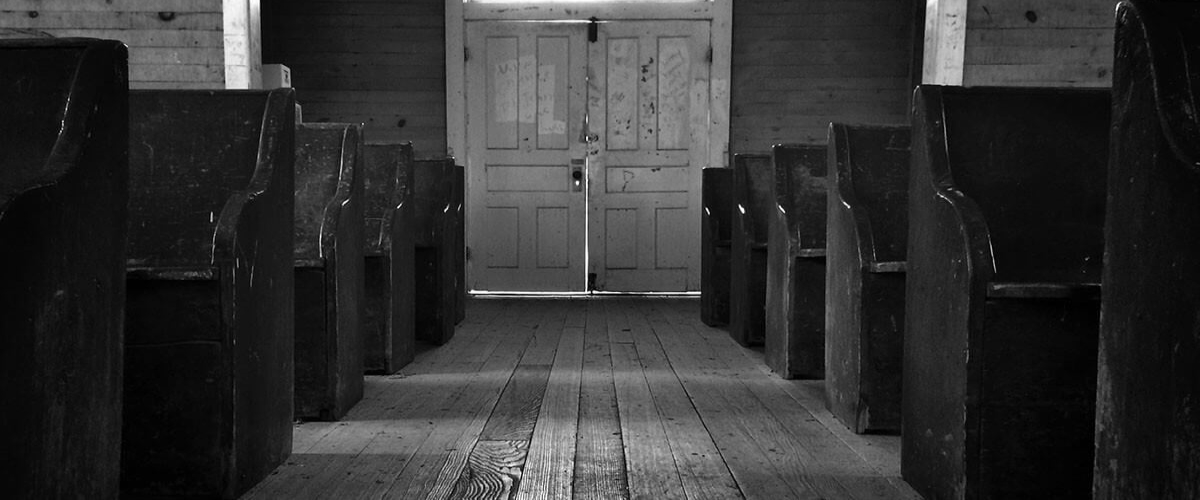People are leaving the Church. I’ve been wondering why, and if anything can be done about it. As mentioned in my previous post, we could approach the “why” from a couple different directions. We could say that the issues lie within the church or that the problem is the culture. Actually, they both have a part in creating this not so desirable exodus. For this post, we will focus on the culture and address the church another time. Even so, it’s not enough to identify the problems; we need solutions. After interviewing around 20 people (at this point), here’s some thoughts on possible solutions.
The Problem Is the Church ♦ What to Do About It
Humanity has a deep and abiding need to belong. Despite our constant declarations as to our individualism, we cannot live long in isolation. We need to be with others; we need to belong with others. I have placed this issue under the subtitle: The problem is the culture. But actually, there’s nothing wrong with the culture (and individuals in the culture) wanting to belong. It’s intrinsic to what it means to be human. The issue or problem is not that the need exists, but that the options for belonging are few and seldom good or healthy, and I include the Church among those failed options.
No one wants to be rejected.* It’s a feeling that goes contrary to the human inclination to belong, and it’s a feeling that proves that humanity in its nature is not meant to be solely individual. We are also collectives. We will belong. The question becomes one of where? To speak broadly, people will belong to the Fallen World System or they will belong to God’s Restored System (The Church is this Restored System—when it is at its best.)
Many people leave the Church because they feel excluded. (This is especially true regarding issues of sexuality.) They feel unwanted—not welcome. The church usually does not provide a place of belonging. The church typically says, “Believe or leave; our way or the highway.” Why not welcome people in, give them an opportunity to belong, and then maybe they will come to believe. They belong in order to believe.
I was talking with a young woman the other night, and she said her friends don’t want to enter the door of a church because of what they would have to give up. They enjoy their lifestyle. They want to be able to drink and party or sleep with whomever, whenever. But I would say to her friends, “Come as you are.” There is not an expectation of changing your life—not at this moment. All we expect is for you to be belong and be a part. And if you make changes down the road; it’s because you want to or feel lead to by God. Not because of some expectation put upon you.”
This approach of allowing people to belong is one of hospitality, a forgotten practice in today’s world—and in the Church. We treat church as an exclusive club, which in one sense is understandable; there’s some truth to it. The Church is exclusive in the sense that not every person in our society belongs to a church. But we are not exclusive in that we do our best to keep people out. In fact, we want as many people to join our club as possible. Our attitude should not be “my way or the high way,” but “the more the merrier.”
If people will not or cannot belong in God’s system they will belong to another system—one that welcomes them. This may explain why people join cults or gangs or communities that let them live the way they choose. They will belong somewhere.
The culture at large thinks they can and should have everything. They believe they should have it all—via the fallen world. They consider the ways of God or the Church to be restrictive or limiting. That is, they believe the Church tells people you can’t have everything you want or do whatever you want. And to some degree they are right.
When Satan tempted Eve, he tricked her into thinking God was holding out. “Did God really say you can eat from any tree? Is the entire garden really yours? No, God is keeping the best from you. But guess what, I can give you everything.” This is Satan’s lie; God is holding out. And this is the lie that pervades the culture.
How can we help people see the lie? We can show people the ultimate destination of the lie. The reality of the matter is that the so called freedom of the fallen world can turn into an incredible bondage. Perhaps it’s one they recognize; but more likely, it is one they don’t, can’t, or won’t. And the thing about bondage is, most of the time it leads to hardship, suffering, and ruin. Do what ever you want, but it’s not necessarily for your good. It could be for ruin or destruction. It’s a path that leads to death.
How can we help people discover the truth? By proclaiming it. The reality is this: in God and his Church is everything—every good thing. Jesus put it this way, “If God cares for the birds of the air, will he not give you every good thing?” The keywords are “every” and “good.” If there is a restriction, it’s for good reason. It’s not a rule to limit us, but a boundary to protect us—to protect us from evil. The fallen world is not really a place of everything or anything, as the culture (and Satan) would have us think. The goal or objective is actually to place people in bondage.
The Church is seen as restrictive and abusive and not as a place where you can have it all. But this is not as it should be. In God and the Church people can have everything—every good thing. The way we change their perception is to ensure we establish an environment of hospitality and grace. And second, invite people to come and taste that the Lord is good—not restrictive. We could do this reorientation through a myriad of possibilities that don’t include inviting them to church on Sunday. We invite people to be themselves, and as mention above, to come as they are. They don’t have to give anything up. If they decide to give something up down the road, its because they have come to the conclusion it truly is for their good.
The spirit of the age is one of anti-establishment or anti-institution, and the church is considered an institution. They throw out the church, toss her aside, along with all other institutions. There is a pervasive anti-institutional sentiment within the culture. And for good reason: most intuitions have failed us. They have done little to mitigate the pain, suffering, hunger, and loss in the fallen world. Until the Church can demonstrate that it is unlike all other institutions—one that is transformational not incompetent, liberating not oppressive, empowering instead of crushing—it will continue to be included along with all the other “failed” institutions.
The Church has the benefit of providing something outside the world’s fallen system. The Church has the advantage of being its own “nation” or “kingdom”—the Kingdom of Heaven, as Jesus liked to say. As such, it can provide an alternative system to the fallen world system, an alternative institution to the fallen institutions.
If we are talking about the Church, Jesus said something remarkable. He said, “I will build my Church and the gates of Hades will not prevail against it.” To put it into the positive, “I will build my church, and it will prevail over Hades.”
There are a number of ways to understand or explain the word “Hades.” For instance, we could consider Hades to be the equivalent of the fallen world system, or the fallen world system to be an expression of Hades. And what ever this fallen system provides, the Church will prevail with something better—something life giving. Unfortunately, to often the Church has failed to live up to this lofty expectation, dare I say requirement, of Jesus. If all authority and power have been given to him, as he says, then we have all we need in Christ to fulfill this expectation. Its time we seized it. It’s time we provide an alternative “institution” or “system,” one that will appeal to the culture at large.
Admittedly, given the spirit of the age, this is an uphill battle. But as long as God is a part of what we are doing, as long as his presence is a reality, and it is—then it’s in the realm of possibility. All things are possible with Christ.
*Even the church wants to belong. The church does not want to be rejected. For that reason, the Church finds a way to belong to the prevailing culture. This is understandable but also regrettable. The master said, “The servant is not greater than the master. If they have rejected me; they will reject you too.” Instead of deciding we will belong to Christ as his servant, and endure rejection as he was rejected, we have decided rejection is too unpleasant to endure. We will, instead, acquiesce to the world. Most often, this is where the Church finds its belonging—not in Christ, but in the World. No wonder Jesus warned us, do not be “of the world.” In other words, “Don’t belong to it. You belong in me.”


 “The church is: a conspiracy of love for a dying world, a spy mission into enemy occupied territory ruled by the powers of evil; the greatest news the world has ever heard, the most life changing and most revolutionary institution that has existed on earth.”
“The church is: a conspiracy of love for a dying world, a spy mission into enemy occupied territory ruled by the powers of evil; the greatest news the world has ever heard, the most life changing and most revolutionary institution that has existed on earth.”